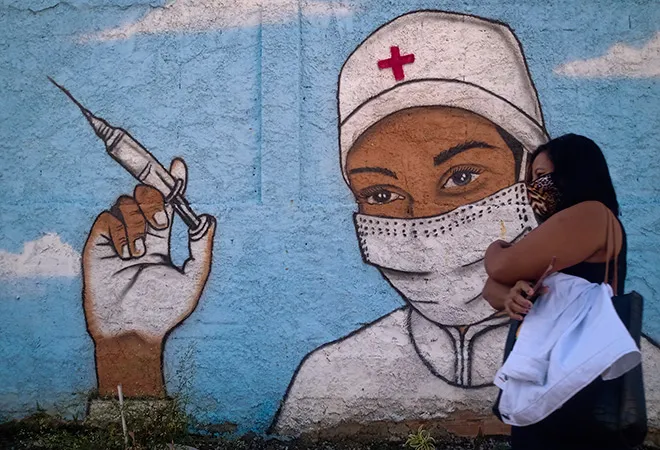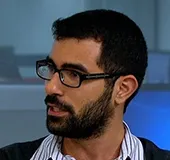 This article is part of the series The COVID-19 Vaccine Challenge: Contextual and Country Analysis.
This article is part of the series The COVID-19 Vaccine Challenge: Contextual and Country Analysis.
When the first cases of COVID-19 were confirmed in Brazil in February 2020, the country had a relative advantage in relation to most other nations in the world. The lethality of the disease was already recognised, with cases in Europe and Asia already being widely publicised. The World Health Organisation (WHO) was also announcing the preliminary recommendations to deal with the crisis, such as the use of masks and the adoption of social isolation strategies. At the same time, Brazil is a country with a robust Centralised Public Health System (SUS), which, despite being historically underfunded, had expertise in dealing with pandemics and unified responses to health issues across its continental extension.
The warnings and recommendations, however, had no effect. The federal government of President Jair Bolsonaro declared that the “economy” should be prioritised, arguing that COVID-19 was “a little flu” and that any measure of social isolation would cause “hunger and chaos”. The “economy or health” dichotomy proved disastrous: The country’s GDP fell by more than 4 percent in 2020, the worst showing in 24 years, with unemployment reaching 14 percent of the population. At the same time, Brazil has become one of the worst countries in relation to the fight against COVID-19: In July 2021, it had registered more than 500,000 fatalities; the second country in absolute number of deaths and the 13th in terms of fatalities proportional to the population. The country had only 2.7 percent of the world’s population and 12.6 percent of all deaths caused by COVID-19 at the same time. The SUS was not employed in a unified way, with actions such as the distribution of masks or medicines being carried out erratically. The absence of the federal government meant that state governors ended up assuming part of this responsibility, which generated benefits, on the one hand, but ended up increasing the inequality of access to health and vaccines in the country even more.
The federal government of President Jair Bolsonaro declared that the “economy” should be prioritised, arguing that COVID-19 was “a little flu” and that any measure of social isolation would cause “hunger and chaos”.
Vaccine paradiplomacy
It is within this disastrous context that different political actors in Brazil began the process of purchasing and developing vaccines against COVID-19 in the first half of 2020. On the one hand, based on the interpretation that COVID-19 was not a relevant threat, the federal government reinforced a lack of interest in obtaining the shots, ignoring successive emails from Pfizer, for example, about sales negotiations. The then Minister of Health, army general Eduardo Pazuello, stated that he did not understand why the country was in “such a hurry and anguish for vaccines”. A Federal Senate committee has also shown that the delay may also have been used by government officials to overprice the purchase of vaccines in cases of corruption, although investigations are still ongoing.
On the other hand, state governors initiated international movements to try to obtain the vaccines—in an intense process of paradiplomacy that aimed to bypass the federal government. This represents a major change in Brazil’s international policy, galvanised by the new coronavirus pandemic: Historically, actions of international cooperation and foreign policy were carried out by the Ministry of Foreign Affairs, the “Itamaraty”, perceived as a technical ministry and mostly isolated from greater political influence. Itamaraty ended up becoming a spokesman for the federal government during the pandemic, openly criticising China, including allusions that the virus was a tool to expand Beijing’s power around the world. This strategy—clearly an attempt to replicate the actions of then US President Donald Trump, whom Bolsonaro pointed out as his greatest ally—made it difficult to cooperate with China, not only regarding the vaccines but even to obtain ingredients for domestic production.
The more assertive international position of the governors is representative of a historic change in how different political groups in Brazil establish international cooperation practices and should be taken into account by States and companies that wish to operate in Brazil from now on.
This informal blockade was overcome by actions of subnational actors in two major movements: In the state of São Paulo and in the so-called “Northeast Consortium”, a coalition of states in that region of the country. The first—the richest state in Brazil with a recognised centre for medical research, Butantan—used commercial offices already established in China to sew an agreement, in the first half of 2020, with the Sinovac laboratory, which would carry out tests of the Coronavac vaccine in Brazil. The first doses were to be administered in January of 2021, with the Coronavac ending up having a positive side effect: Fearful that São Paulo Governor João Doria would employ the positive media coverage to take higher flights in the 2022 presidential elections, the Bolsonaro government ended up accelerating partnerships to obtain other vaccines, with agreements—weeks later—with the company AstraZeneca. In the case of the “Northeast Consortium”, governors managed to negotiate directly with Chinese companies to obtain ventilators and other hospital supplies. Brazil currently applies three different vaccines: Comirnaty (Pfizer/BioNTech), Coronavac (Butantan/Sinovac), and Covishield (AstraZeneca/Oxford).
The more assertive international position of the governors is representative of a historic change in how different political groups in Brazil establish international cooperation practices and should be taken into account by States and companies that wish to operate in Brazil from now on. Subnational actors have become relevant partners in a scenario where the federal government is increasingly isolationist. Governors of the Amazonian states, for example, have already signalled that they intend to negotiate actions to combat deforestation directly with the European Union, pointing to a future where subnational actions will not be restricted to the issue of the pandemic.
Immunisation inequality
If the greater assertiveness of the governors ensured that Brazil started its vaccination process more quickly—the lack of centralised coordination ended up causing the doses to be distributed very unevenly, harming precisely the poorest part of the population. Although the Ministry of Health has established a national vaccination programme, which means that most vaccines are distributed proportionally across the states, the absence of clear actions causes strong distortions. As of July 2021, vaccination in Brazil against COVID-19 was proceeding at a slow pace: Approximately 100 million doses were administered—in relation to the proportion of the population vaccinated, the country is in the 73rd position in the world ranking. The comparison can also be made with Brazil itself: The Ministry of Health states that the country has an installed capacity to vaccinate 2.4 million a day and it has previously vaccinated 10 million children daily in a campaign against polio. But since 17 January, 2021, Brazil has only surpassed the mark of 1 million vaccinated in 24 hours 10 times. China, for example, has been vaccinating 20 million a day in the last months.
In the city of Rio de Janeiro, a resident of Leblon, one of the most expensive square metres in Latin America, is three times more likely to have received the first dose of the COVID vaccine than a resident of the Vidigal Favela, located a few miles away.
The lack of centrality in health coordination means that some places in Brazil are more impacted by the lack of vaccines and the unequal distribution of the immunising agent. In the city of São Paulo, the most vaccinated districts have an average income eight times higher and vaccinate four times more than the less vaccinated districts. In the city of Rio de Janeiro, a resident of Leblon, one of the most expensive square metres in Latin America, is three times more likely to have received the first dose of the COVID vaccine than a resident of the Vidigal Favela, located a few miles away. This data is also reflected in the immunisation of the black population in Brazil, who have been historically poorer: Data from March 2021 shows that the White population (43 percent) represents almost twice as many as Blacks (21 percent) amongst those vaccinated—a percentage far below their representation in the population, which is nearly 56 percent of the total population. These numbers also demonstrate the limitation of action by governors and mayors.
Although health actions are constitutionally a responsibility shared by the federal, state, and municipal governments, Brazil’s budgetary and political structure favours the former.
The views expressed above belong to the author(s). ORF research and analyses now available on Telegram! Click here to access our curated content — blogs, longforms and interviews.



 This article is part of the series
This article is part of the series  PREV
PREV


